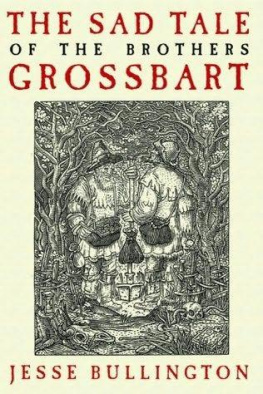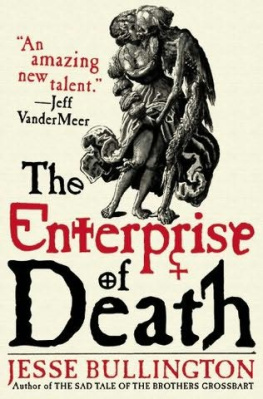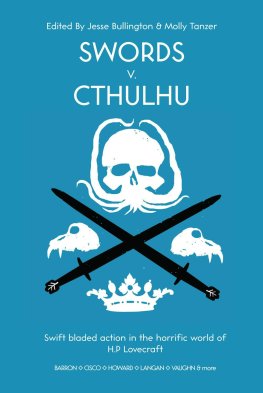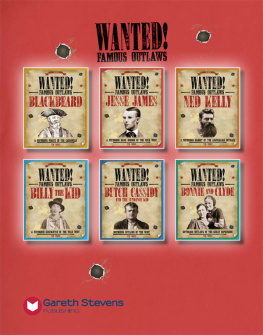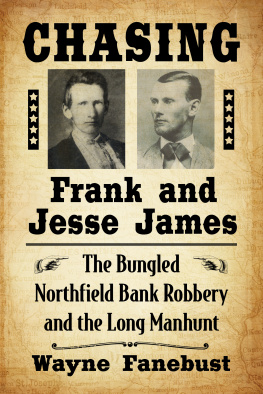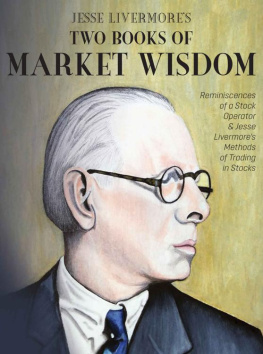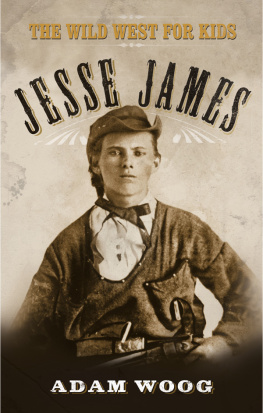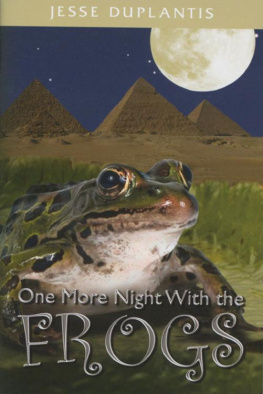Jesse Bullington - The Sad Tale of the Brothers Grossbart
Here you can read online Jesse Bullington - The Sad Tale of the Brothers Grossbart full text of the book (entire story) in english for free. Download pdf and epub, get meaning, cover and reviews about this ebook. year: 2009, publisher: Orbit, genre: Detective and thriller. Description of the work, (preface) as well as reviews are available. Best literature library LitArk.com created for fans of good reading and offers a wide selection of genres:
Romance novel
Science fiction
Adventure
Detective
Science
History
Home and family
Prose
Art
Politics
Computer
Non-fiction
Religion
Business
Children
Humor
Choose a favorite category and find really read worthwhile books. Enjoy immersion in the world of imagination, feel the emotions of the characters or learn something new for yourself, make an fascinating discovery.
- Book:The Sad Tale of the Brothers Grossbart
- Author:
- Publisher:Orbit
- Genre:
- Year:2009
- Rating:5 / 5
- Favourites:Add to favourites
- Your mark:
- 100
- 1
- 2
- 3
- 4
- 5
The Sad Tale of the Brothers Grossbart: summary, description and annotation
We offer to read an annotation, description, summary or preface (depends on what the author of the book "The Sad Tale of the Brothers Grossbart" wrote himself). If you haven't found the necessary information about the book — write in the comments, we will try to find it.
The Sad Tale of the Brothers Grossbart — read online for free the complete book (whole text) full work
Below is the text of the book, divided by pages. System saving the place of the last page read, allows you to conveniently read the book "The Sad Tale of the Brothers Grossbart" online for free, without having to search again every time where you left off. Put a bookmark, and you can go to the page where you finished reading at any time.
Font size:
Interval:
Bookmark:
The year is 1364. Hungry creatures stalk the
dark woods of medieval Europe, and both sea
and sky teem with unspeakable horrors.
This is the world of the Brothers Grossbart
What is this fuck ? Martyn asked.
What? Hegel said.
Who? Manfried said.
Fuck, Martyn repeated, fucking, fuck, fuckerthe word you like so much. A slur?
Oh, the word fuck! Manfried laughed. Yeah, a slur, right enough. Village not too far from our birth-homes called Fuckin.
Why did they name it after a slur? asked Martyn.
Oft have I mused the same question, said Hegel.
You have? Manfried grinned at his brothers folly. Hardly surprisin. Nah, Martyn, its like this. Fuckins a town filled with men what are assholes, but assholes so mecky it dont serve to just callem assholes or mecky assholes or even Maryless mecky assholes, gotta get somethin stronger by way a differentiatin, to say nuthin a brevity. Hence, we call someone so mecky they mights well been from Fuckin a fucker or a fuckwit or anythin else related to bein from Fuckin. Yeah?
There was a long silence on the bench before Hegel cleared his throat. Or the act a fornication. Bein a mecky deed, the term may be applied there as well.
Copyright 2009 by Jesse Bullington
Excerpt from The Company copyright 2008 by K. J. Parker
All rights reserved. Except as permitted under the U.S. Copyright Act of 1976, no part of this publication may be reproduced, distributed, or transmitted in any form or by any means, or stored in a database or retrieval system, without the prior written permission of the publisher.
Orbit
Hachette Book Group
237 Park Avenue, New York, NY 10017
Visit our website at www.HachetteBookGroup.com
www.twitter.com/orbitbooks
First eBook Edition: November 2009
Orbit is an imprint of Hachette Book Group. The Orbit name and logo are trademarks of Little, Brown Book Group Limited.
The characters and events in this book are fictitious. Any similarity to real persons, living or dead, is coincidental and not intended by the author.
ISBN: 978-0-316-07192-5
Contents
Dedicated to
Raechel
Molly
John
David
Travis
Jonathan
The story of the Brothers Grossbart does not begin with the discovery of the illuminated pages comprising Die Tragdie der Brder Groe Brte tucked inside a half-copied Bible in a German monastery five hundred years ago, nor does it end with the incineration of those irreplaceable artifacts during the firebombing of Dresden last century. Even the myriad oral accounts that were eventually transcribed into the aforementioned codex by an unremembered monk hardly constitute a true starting point, and, as the recent resurgence in scholarship testifies, the chronicle of the Grossbarts has not yet concluded. The pan-cultural perseverance of these medieval tales makes the lack of a definitive modern translation even more puzzling, with the only texts available to the contemporary reader being the handful of remaining nineteenth-century reprints of the original documents and the mercifully out-of-print verse translations of Trevor Caleb Walker. That Walker was a better scholar than a poet is nowhere more evident than in that vanity edition, and thus came the impetus to retell Die Tragdie in a manner that would transmit the story as it would have been appreciated by its original audience.
The distinction here between stories and story represents what is, presumably, a first in the fieldrather than treating Die Tragdie as a collection of independent fragments, comparable to the contemporaneous Romance of Reynard , I have focused on the quest continuously reiterated by the Grossbarts themselves in order to cobble together a cohesive and linear narrative. A benefit of transforming the work into a single account is the inclusion of previously unlinked stories, divergences that illuminate aspects of the greater narrative even if they at first seem quite disparate save for their era and locale. Another consequence of this approach is that small leaps occasionally occur in the journey as overly repetitious adventures are elided.
Scholars curious as to whether this humble author sides with the apologists Dunn and Ardanuy or the revisionists Rahimi and Tanzer will be disappointedthis tale is intended for those members of the public having no previous acquaintance with the Grossbarts, and is thus unadorned with academic grandstanding. For this reason, and to avoid unduly distracting the average reader, the following pages lack annotation, with the most popular interpretation of any given incident defaulted to when variations arise. As has already been stated, the adventures of the Grossbarts are often remarkably similar save for localereflecting regional differences on the part of the original storytellersand so marking up these deviations would defeat the entire purpose of the project, which is to convey the tale as it would have come across in its original form. After all, the average German serf would be no more aware that his Dutch neighbors blamed his region for spawning the Grossbarts than the merchant of Dordrecht would be that down in Bad Endorf the Germans insisted his town was where the twins were born.
This is indicative of the gulf separating contemporary readers from the original audience, an audience alien almost to the point of incomprehensibility. Those first storytellers and listeners might, for example, have taken the fantastic and violent elements much more seriously with only hearth or campfire to stave off the perilous night. The fourteenth century, wherein the tales were both told and set, was, as Barbara Tuchman opens her history of that era, a violent, tormented, bewildered, suffering and disintegrating age, a time, as many thought, of Satan triumphant.
Yet it was no arbitrary decision that led Tuchman to title that work A Distant Mirror . Tragedies and atrocities may seem inherently worse when appraised from long after they occurred, but despite all we have accomplished wars rage, righteous uprisings are viciously suppressed, religious persecution thrives, famine and plague decimate the innocent. This is not to excuse or apologize for any cruelties peppering the following pages, but simply to provide a lens, should the reader require one, through which to view them.
We will never know if the Grossbarts were heroes or villains, for as Margaret Atwood observes in her novel The Handmaids Tale , We may call Eurydice forth from the world of the dead, but we cannot make her answer; and when we turn to look at her we glimpse her only for a moment, before she slips from our grasp and flees. That the Grossbarts themselves would take umbrage at both being associated with the witchery of Orpheus quest to the underworld and this particular account of their deeds seems probable, but whether their medieval audience would approve remains forever unknowable. This tale is exhumed for our enlightenment, and while I have done some tailoring for our modern sensibilities their spirit remains just that, and as such, unquenchable. As all historians know, Atwood concludes that selfsame quote, the past is a great darkness, and filled with echoes. Voices may reach us from it; but what they say to us is imbued with the obscurity of the matrix out of which they come; and, try as we may, we cannot always decipher them precisely in the clearer light of our own day. With that wisdom in mind, let us cock our ears and squint our eyes toward the Brothers Grossbart and a beginning in Bad Endorf.


To claim that the Brothers Grossbart were cruel and selfish brigands is to slander even the nastiest highwayman, and to say they were murderous swine is an insult to even the filthiest boar. They were Grossbarts through and true, and in many lands such a title still carries serious weight. While not as repugnant as their father nor as cunning as his, horrible though both men were, the Brothers proved worse. Blood can go bad in a single generation or it can be distilled down through the ages into something truly wicked, which was the case with those abominable twins, Hegel and Manfried.
Next pageFont size:
Interval:
Bookmark:
Similar books «The Sad Tale of the Brothers Grossbart»
Look at similar books to The Sad Tale of the Brothers Grossbart. We have selected literature similar in name and meaning in the hope of providing readers with more options to find new, interesting, not yet read works.
Discussion, reviews of the book The Sad Tale of the Brothers Grossbart and just readers' own opinions. Leave your comments, write what you think about the work, its meaning or the main characters. Specify what exactly you liked and what you didn't like, and why you think so.

